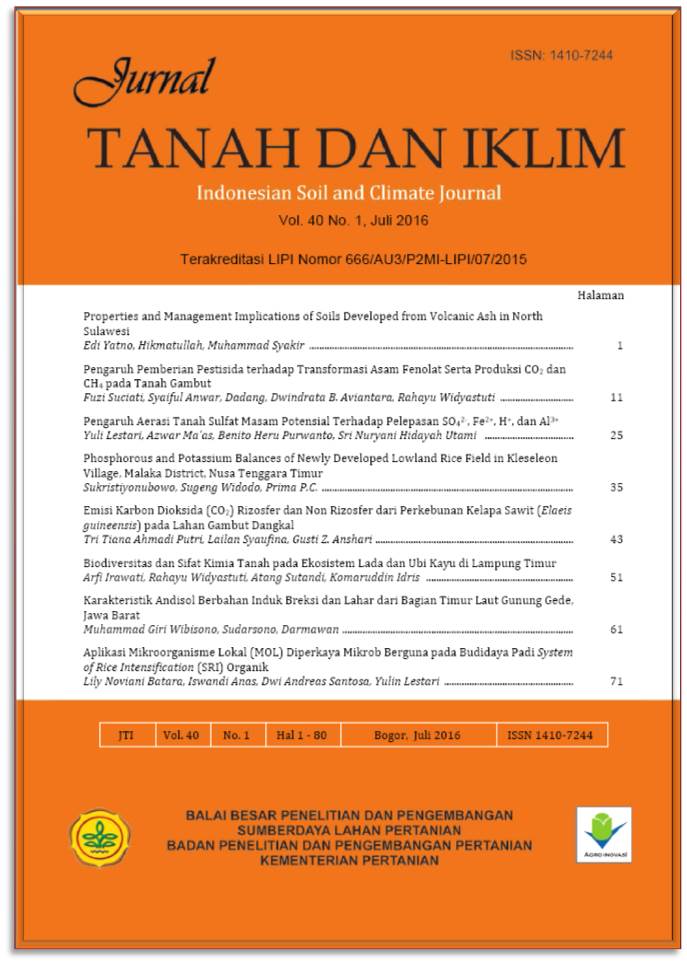Pengaruh Aerasi Tanah Sulfat Masam Potensial Terhadap Pelepasan SO42-, Fe2+, H+, dan Al3+
Abstract
Abstrak. Tanah sulfat masam potensial dicirikan oleh adanya lapisan pirit (FeS2) pada kedalaman 0-50 cm yang stabil pada kondisi anaerobik . Pada kondisi aerobik pirit tersebut teroksidasi menghasilkan kemasaman yang tinggi. Percepatan penurunan kadar pirit melalui proses oksidasi yang dilanjutkan dengan pelindian asam yang dihasilkan. Penelitian ini bertujuan untuk mengukur penurunan kadar pirit sejalan dengan pelepasan SO42-, Fe2+, H+ dan Al3+ akibat aerasi tanah sulfat masam potensial. Penelitian dilaksanakan di laboratorium tanah pada bulan September hingga Desember 2013 menggunakan Rancangan Acak Lengkap yang disusun secara faktorial dengan 3 ulangan. Faktor I adalah tingkat aerasi : (a) kontrol/tanpa aerasi (tinggi muka air 1 cm), (b) aerasi dengan pengeringan selama 2 hari pada suhu 45ËšC, dan (c) aerasi dengan pengeringan selama 4 hari pada suhu 45ËšC. Faktor II adalah kadar pirit: (i) 0,70 %, (ii) 1,96 % dan (iii) 4,39 % yang diambil dari contoh tanah langsung di lapangan. Kadar SO42-, Fe2+, H+ dan Al3+ yang terlepas diamati setiap minggu sebanyak 8 kali, sedangkan penurunan kadar pirit diamati pada akhir penelitian. Hasil penelitian menunjukkan bahwa semakin lama pengeringan dan semakin tinggi kadar pirit awal maka semakin banyak SO42-, Fe2+, sumber kemasaman (H+, dan Al3+) yang dihasilkan. Konsentrasi SO42-, Fe2+, H+, dan Al3+ paling banyak dilepaskan adalah 49,68 cmol(+).kg-1, 7,33 cmol(+).kg-1, 29,97 cmol(+).kg-1 dan 40,66 cmol(+).kg-1 diperoleh pada perlakuan aerasi dengan pengeringan selama 4 hari pada 45ËšC dan kadar pirit 4,39 %. Ini sejalan dengan penurunan kadar pirit sebesar 2,08 % (47,45 % dari kadar pirit awal). Bila kadar pirit rendah (0,7 %), selama 8 kali ekstraksi terjadi penurunan sangat sedikit dengan variasi 0,64-0,67 % yang tidak berbeda nyata antar perlakuan aerasi. Hal ini menunjukkan bahwa perlakuan aerasi dengan pengeringan dapat mempercepat oksidasi pirit bila dilanjutkan dengan pelindian untuk membuang produk oksidasi pada kadar pirit yang cukup tinggi (4,39 %).
Abstract. Potential acid sulfate soils are characterized by the presence of pyrite (FeS2) at a depth of 0-50 cm, that is stable in anerobic condition. In aerobic condition the pyrite is oxidised and causing acidity. Efforts to accelerate the oxidation of pyrite and followed by the leaching of acids is the target of this experiment. This study was aimed to observe the release of SO42-, Fe2+, H+ and Al3+ and the decrease of pyrite content. The research was conducted at a soil laboratory from September until December 2013 arranged in a factorial completely randomized design with three replications. The first factor was the degree of aeration, namely : (a) control (saturated with 1 cm of water above soil surface); (b) aeration by drying for 2 days at 45ºC; and (c) aeration by drying for 4 days at 45ºC. The second factor was the concentration of pyrite ; (i) 0,70 %, (ii) 1,96 % and (iii) 4,39 %. Soluble concentration of SO42-, Fe2+, H+ and Al3 were observed every week for 8 times, while the the levels of pyrite was observed at the end of the study. The results show that the sources of acidity (H+ and Al3+), SO42-, and Fe2+ increased with the length of drying time and the initial concentration of pyrite. The highest concentration of SO42-, Fe2+, H+, and Al3+ released were 49.68 cmol(+).kg-1, 7.33 cmol(+).kg-1, 29.97 cmol(+).kg-1 and 40.66 cmol(+).kg-1, respectively. The decline of initial pyrite content was 47.45 % under the 4 day drying of 4.39 % pyrite content treatment. Under the low pyrite contents (0.7 %), the acidity decrease was not sigfinicantly different among treatments with a variation of 0.64-0.67 %. This suggests that aeration by drying speeds up of the pyrite oxidation if followed by leaching at the high pyrite contents (4.39 %).
ÂÂÂÂ


